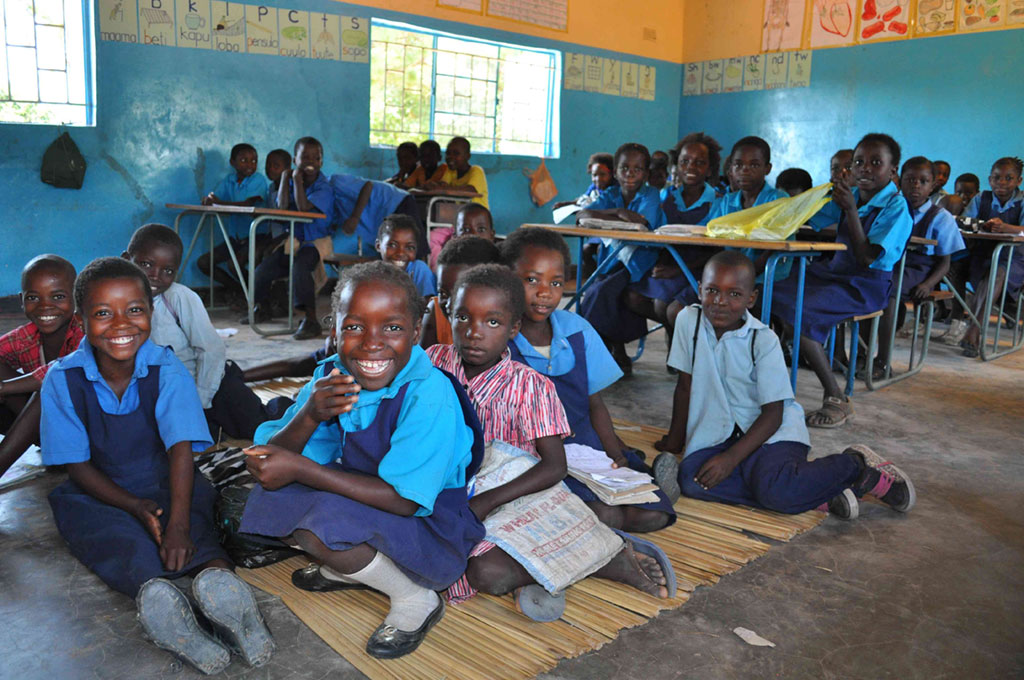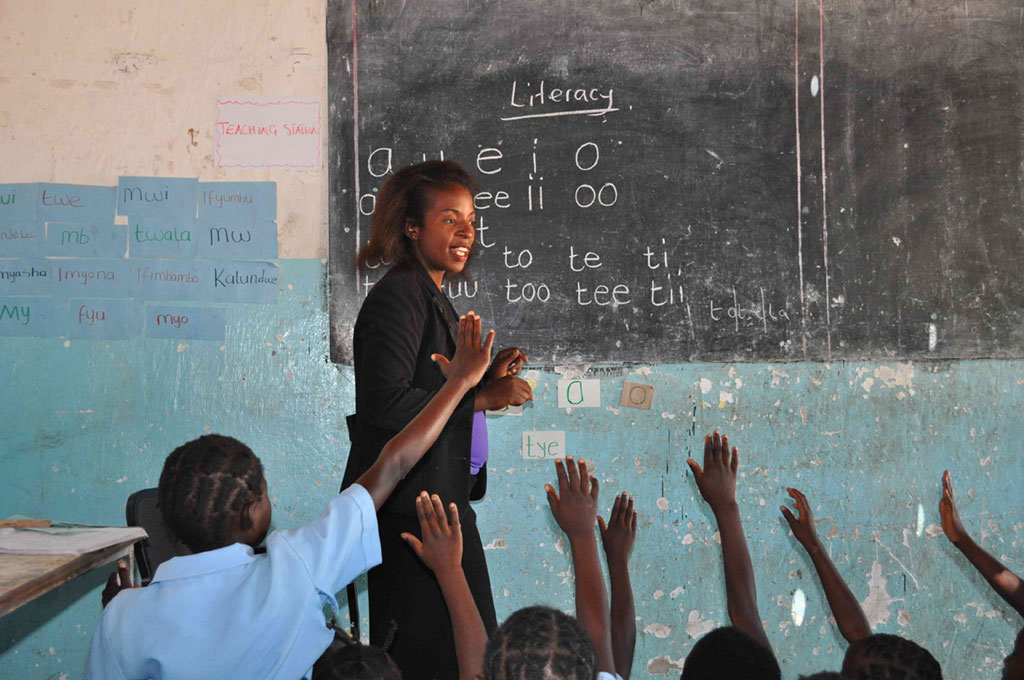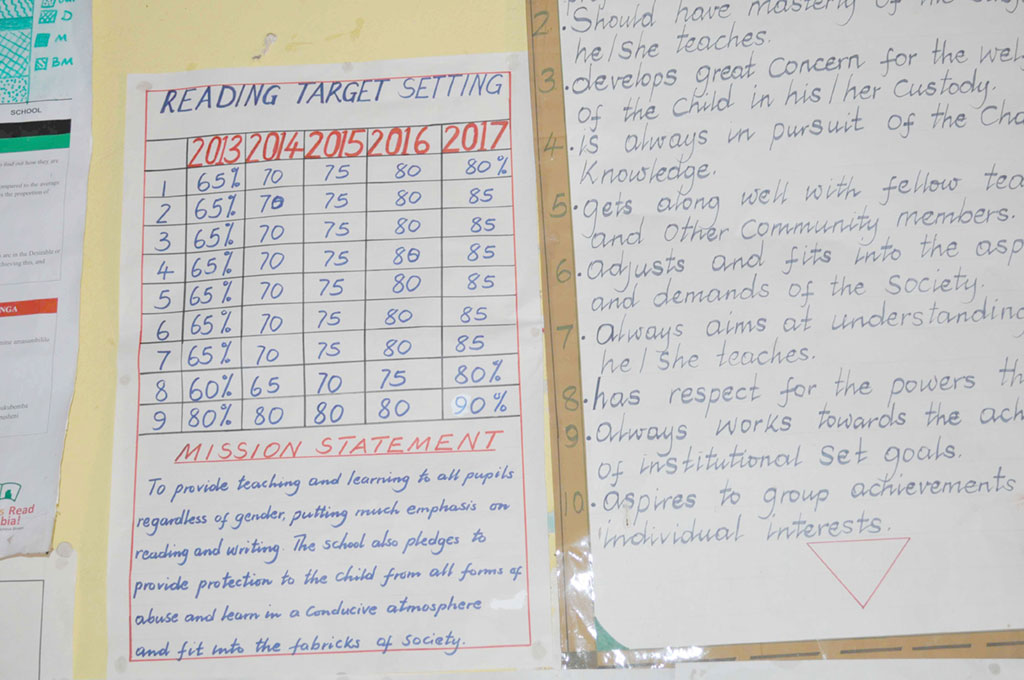Mansa, Zambia—Second and third graders here are experiencing something today their older siblings did not—reading with improved ability.
The nation has typically registered the lowest literacy scores among the Southern African Development Community states, but a midline survey from the U.S. Agency for International Development’s Read to Succeed project reports substantial gains in seven key areas of early grade reading, including letter sound knowledge, oral reading fluency, and reading and listening comprehension.

“Now, you pick any child to read a particular word and you will find that the children are able to read. [In the past], it was quite difficult to find pupils at a grade 1 or 2 level reading,” says Simon Kanchebele, Acting Provincial Education Standards Officer for Luapula Province, one of the six provinces implementing the project in Ministry of General Education primary schools.
The five-year project, which is implemented by Creative Associates International, aims to improve reading among learners in grades 1 to 4 in their local Zambian languages. It works in more than 1,200 primary schools in six provinces.
"Now, you pick any child to read a particular word and you will find that the children are able to read.” Simon Kanchebele, Acting Provincial Education Standards Officer for Luapula Province
Using a “whole school, whole teacher, whole learner” approach, USAID Read to Succeed works to improve learning, teaching, school management, parental and community support and responsiveness to a child’s psychosocial needs.
A midline early grade reading assessment, released in 2015, revealed a 296.6 percent jump in reading comprehension among second and third graders in USAID Read to Succeed-supported schools. The survey also showed gains in oral reading of 237 percent and a 131.2 percent jump in letter sound knowledge. The midline survey randomly sampled 4,000 second and third graders across 200 schools in 16 districts (12 project districts and 4 non-project districts).
A comparative analysis of schools participating in USAID Read to Succeed and non-participating schools showed that project-supported districts are performing better in all subtasks of reading except listening comprehension, where performance is comparable.
Click here to see videos and stories from the special report, “Zambia: Turning the page for better schools.”
Phonics as the building blocks

USAID Read to Succeed’s phonics-based method is easy to teach in resource-scarce environments, utilizing techniques like teacher-produced decodable stories and simple principles that can be taught with chalk and a black board, paper flash cards, and interactive games and lessons.
The approach trains educators to guide learners as they progress from a letter to a sound to a word to a sentence. Phonics, phonemic awareness, fluency, vocabulary and comprehension are the key elements of the methodology.
Across the country, the impressive midline results are energizing educators who struggled in the past to effectively teach literacy and relied on expensive, complicated materials and books, which were hard to come by.
“Seeing a child break through feels very good,” says Nancy Kawila, a grade 2 teacher at Mulundu Primary School and the Zonal In-service Coordinator for her zone in the Mwense District of Luapula Province. “They are able to blend from letters into words and sentences…. They are able to write simple sentences on their own.”
Reaching higher

In the two-year period measured by the survey (2012 to 2014), grade 2 and 3 readers as a group advanced from reading an average of 2.16 words per minute at baseline to 7.26 words per minute at the midline.
While this is significant progress, the study notes that this still falls short of national standard minimum requirements of 25 and 40 correct words read per minute for grades 2 and 3 respectively.
Overseeing several aspects of the project implementation in Luapula Province—the best performing province in the study—Kanchebele attributed the success of USAID Read to Succeed to “the consistent implementation of interventions in Read to Succeed-supported schools.”
But he recognizes that the hard work is not over as new readers still have challenges to surmount and more young learners continue to enter school eager to make their own literacy gains.
“We need to work harder,” he says, emphasizing that reinforcing and advancing comprehension and fluency will be key goals as the Ministry plans for sustaining and building on primary school reading gains after the project closes next year (2017).
Equipping school managers for school effectiveness
The midline survey also reported significant improvements in school management and school effectiveness, based on interviews and observations of two teachers and the head teacher at each of the 200 schools included in the survey.
Nearly all head teachers (99.5 percent) reported that literacy is now taught for an average of 60 minutes as a separate subject, compared to only 25 percent of head teachers reporting this at the baseline.
“From the training I received as zone head and head teacher, it has ignited my leadership skills, and when leadership skills are ignited they can be passed on to others.” Brighton Musukambale, head teacher at Mulundu Primary School
All head teachers rated their own knowledge of how to teach early grade reading higher from baseline to midline. For example, 63.2 percent rated their knowledge as “pretty good” at midline, compared to only 48.7 percent of head teacher self-rating as “pretty good” at baseline.
Working within existing Ministry of General Education systems, USAID Read to Succeed has trained head teachers as well as larger support teams at the national, provincial, district, zonal and school levels in best practices for supporting project activities and providing ongoing mentoring and coaching to early grade literacy teachers.
At the school level, head teachers have proven especially instrumental in helping literacy instructors develop their skills and get through to young readers.
“From the training I received as zone head and head teacher, it has ignited my leadership skills, and when leadership skills are ignited they can be passed on to others,” explains Brighton Musukambale, head teacher at Mulundu Primary School.
In the survey, head teachers reported increased attention to teacher support for literacy instruction, including holding regular teacher group meetings and conducting frequent classroom observations and learner assessments to identify and fill in gaps in learning and teaching.
Leah Chanda, a grade 1 teacher at Mulundu Primary School, says these assessments help her to “make note of the weaknesses and target each individual based on what he or she faces.”
Based on the progress she has already seen, Chanda is confident that by the end of the year her students will be reading and writing with ease.
The midline interviews and observations of teachers also demonstrated strong pedagogical practices, including lesson planning, interactive lessons and teacher engagement with parents and community members, who are key in encouraging school attendance and assisting learners at home.
Together, these advances in school management and school effectiveness have contributed to the overwhelming success of the project methodology and huge gains in reading for young Zambians.
“Now pupils attack words following the sounds…that method is very progressive. We’ve got children who are able to read at a very tender age. They are even writing stories,” says head teacher Musukambale.
Looking ahead, Musukambale is optimistic about the future of literacy at his school and in the country.
“I’ve seen great writers ahead of us. By the time a child is in grade 8 or grade 9, I know the child will be a great writer. We have lost out on great writers in Zambia. I think this is a starting point.”
With reporting by Nephas Hindamu
